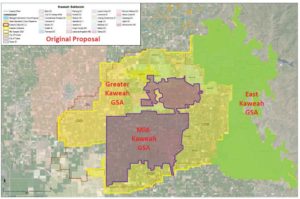
Mark Larsen, from the Kaweah Delta Water Conservation District, and water lawyer Aubrey Cairns Mauritson moderated a workshop on the controversial Sustainable Ground Water Management Act (SGMA). Passed in the fall of 2014, the new law affects everyone who pumps groundwater, from farmers to homeowners. The workshop took place May 23 at the Wyndham Hotel, next to the Visalia Airport.
Mauritson explained that an effort to manage groundwater has been floating around Sacramento for years and that Governor Jerry Brown used the drought as an opportunity to finally get the legislation passed. The goal of the law is to ensure that the same amount of water is returning to the underground aquifer as is pumped out. The key word in the new law is “sustainable.”
If the Kaweah Sub-basin does not become sustainable by 2040, the state will take over the basin and regulate all extractions. Right now the Kaweah Sub-basin is ranked as the third worst in the state out of 515 basins in terms of being critically over drafted.
Much needs to be done between now and 2040 in order that Tulare County can comply with SGMA.
The first step mandated by SGMA is to form Groundwater Sustainability Agencies (GSA). These agencies are comprised of cities, counties, irrigation districts, ditch companies and water conservation districts. The purpose of the GSAs is to come up with a plan for sustainability.
Three GSAs are being formed in the Kaweah Sub Basin. Although all must agree on one final plan, the three GSAs ensure that no one’s interests are left out of the conversation. The three GSAs are: Mid Kaweah, Greater Kaweah and Eastern Kaweah. Mid Kaweah has already been approved by the Department of Water Resources and the other two will be by this summer or early fall.
Paul Hendrick, from Tulare Irrigation District (TID), gave a presentation on the Mid-Kaweah GSA, which is comprised of TID, the City of Visalia and the City of Tulare. Michael Hagman, manager of the Lindmore Irrigation District, presented the Eastern Kaweah GSA, which is mostly eastern Tulare County, and comprising of the City of Lindsay and Strathmore, the Foothill irrigation districts and Wutchumna Water Company. Larsen presented the details of the Greater Kaweah GSA, which comprises of everything that is not the Eastern GSA or Mid-Kaweah GSA.
If the Kaweah sub-basin complies with the SGMA timeline, the state will not take control of the groundwater. The timeline has three major deadlines. The first is June 30, 2017, when all GSAs need to be formed and approved by Department of Water Resources. The next is January 31, 2020, when the GSA’s need a finalized sustainability plan that must agree with the other GSAs. Finally, the basin has 20 years after that, or until 2040, to successfully reach sustainability.
All three GSAs can have their own plan but certain data have to agree. These elements are the groundwater elevation, groundwater extraction, surface water supply, total water use and what is a sustainable yield. A sustainable yield is when no more water is being taken out of the basin than can be replaced.
To implement their plans, each GSA has certain powers. They will need landowners to register their wells and require accurate measuring devises be put on these wells at the owners’ expense. The GSA may purchase property along with the property’s water rights. The GSAs can call for the fallowing of land, exchange water or water rights and has the authority to control how much water a landowner pumps out of the aquifer.
The only exception to this are homeowners who use less than two acre-feet of water per year. An average family uses one acre-feet a year of water or less.
The bottom line is that the groundwater may disappear without sustainability measures. Also, because of over-pumping, the land is sinking. To counteract this subsidence, the GSAs are going to be regulating how much water a land owner pumps out of the ground.
The main message of the workshop was that everyone who pumps groundwater needs to get involved.
The best way to do that during the initial planning stage is to contact the Tulare County Farm Bureau or your local water or irrigation districts. Residents can call the Farm Bureau at (559) 732-8301.
